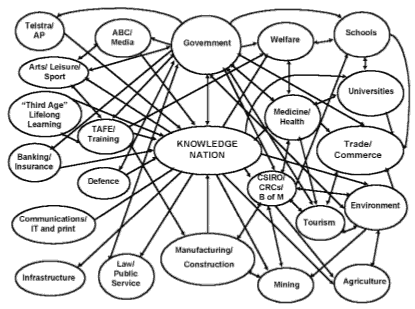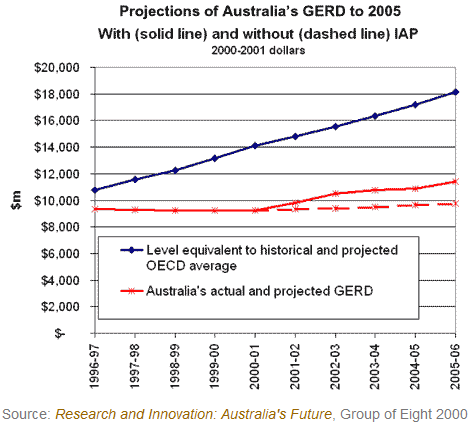|
Editorial-30 July 2005 |
|
 |
|
Labor's Barry Jones' diagram of the interactions between players in a "Knowledge Nation." Its appearance of complexity allowed the Coalition sarcasm to attack its look rather than be challenged by the program's intent. |
Concurrently the Australian Democrats seem to have become inexorably irrelevant because of ineffectual party discipline while the Greens' narrow focus appears to render them effectively uninterested in many issues of consequence.
In any case, with the exception of Labor's still born "Knowledge Nation" in 2001, none of the opposition political parties has even attempted to put forward critically shaped policies concerning public support for the tertiary education sector or research in the sciences and humanities. Certainly all of them have put out statements with an obligato of hand-wringing and gnashing of teeth decrying the damage that the Federal Coalition continues to perpetrate, but meaningful documentation indicating what any of them would do to rectify the problems is nonexistent.
And if the truth be told, even when the "Knowledge Nation" was formally launched as part of Labor's 2001 platform, detail was lacking and timeframe and costings were ill prepared. The impression left was one of disinterest by the party's power brokers and the party's leader, Kim Beasley.
During the 2004 election the problems engulfing the tertiary education sector and Australia's inadequate support of research and development did not figure significantly in determining voters' party preferences, certainly Labor's Mark Latham showed no enthusiasm for pursuing those issues at any time during his leadership.
It is now not much more than two years before the next Federal general election. Were any of the federal opposition political parties seriously interested in using tertiary education policies and research and development initiatives to match those being undertaken or proposed by our cohort nations they would have to start now to usefully develop policy and programs critically conceived.
There is little indication that that is being undertaken and it is doubtful that it will be done unless a concerted effort is made by the tertiary education sector and the nation's research institutions private as well as public, not only to lobby parliamentarians and party powerbrokers but also to put forward carefully crafted policies which include costing and timeframes over a period of ten to fifteen years. It would also be not only appropriate but essential that the suggested policies be made universally available. Were the resources of the research and tertiary education sectors appropriately utilised there is every reason to believe that the policies developed and their justification would be superior to those put forward either by current government departments or those developed by opposition political parties who command far fewer resources than those available to an incumbent government.
So far what has been lacking is a will by academicians and researchers to get seriously and usefully stuck into policy development and to bring onboard effective lobbyists.
Nothing less than the future well-being of the nation is at stake.
|
Alex Reisner
The Funneled Web
